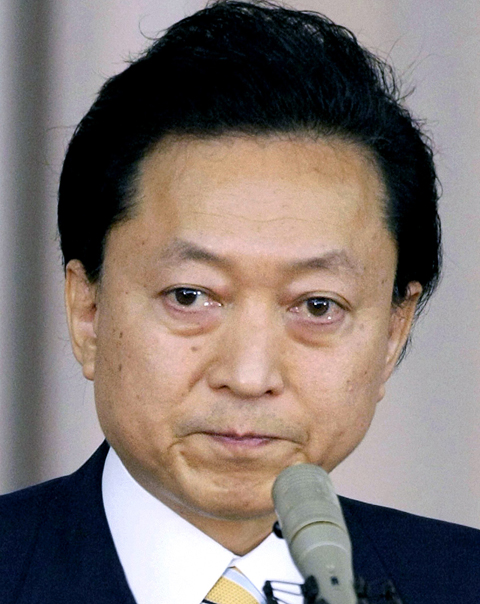Japanese Prime Minister Yukio Hatoyama tearfully resigned yesterday, just nine months after a stunning election win, his brief reign derailed by a row over an unpopular US airbase.
Hatoyama ended more than half a century of conservative rule in an electoral earthquake in August, but soon earned a reputation for crippling indecision at the helm of the world’s second-biggest economy.
The 63-year-old millionaire, the scion of an influential family dubbed “Japan’s Kennedys,” quit at a meeting of his Democratic Party of Japan (DPJ), blaming the base dispute and political funding scandals.

PHOTO: REUTERS
“I will step down,” an emotional Hatoyama told party lawmakers at a special meeting in parliament, while also vowing to “create a new DPJ.”
“I apologize to all of you lawmakers here for causing enormous trouble,” he said.
Japanese Finance Minister Naoto Kan, 63, who is deputy prime minister, was widely tipped to succeed Hatoyama and in the afternoon declared his intention to take over the party leadership in a vote tomorrow.
Kan, a former grassroots civic activist, achieved popularity in the mid-1990s when as health minister he admitted government culpability in a scandal over HIV-tainted blood products.
The new DPJ chief must be elected prime minister by parliament in a vote expected later tomorrow. On Monday, the new prime minister is expected to give a policy address and formally launch his new Cabinet, said the DPJ.
Speculation had swirled for days that Hatoyama would quit as his approval ratings, once above 70 percent, crashed below the 20 percent mark.
His rapid demise since he took office in mid-September was driven by the festering dispute over a US Marine Corps airbase on Okinawa island that badly strained ties with the US, Tokyo’s bedrock ally.
Hatoyama, a Stanford-trained engineering academic, took power vowing less subservient ties with Washington and closer engagement with Asia, worrying many Japan watchers in the US.
He promised to move the US base off Okinawa, to ease the burden for locals who have long complained of aircraft noise, pollution and crime associated with a heavy US military presence since World War II.
However, after failing to find an alternative location for the base in Japan, he backtracked and decided to keep it on the island, enraging Okinawans and his pacifist coalition partners the Social Democrats.
The left-leaning group quit his three-party coalition on Sunday, weakening the government in parliament’s upper house ahead of elections for the chamber expected on July 11, in which the DPJ expects to take a beating.
The DPJ’s most influential figure, Secretary General Ichiro Ozawa, quit after Hatoyama asked him to step down. Both men have been embroiled in political funding scandals.
Hatoyama’s wealthy mother handed large donations to his electoral war chest, triggering a criminal investigation that saw a close aide receive suspended jail terms.
Hatoyama said the funding scandals and the Okinawa issue were the main reasons for his demise.

DAREDEVIL: Honnold said it had always been a dream of his to climb Taipei 101, while a Netflix producer said the skyscraper was ‘a real icon of this country’ US climber Alex Honnold yesterday took on Taiwan’s tallest building, becoming the first person to scale Taipei 101 without a rope, harness or safety net. Hundreds of spectators gathered at the base of the 101-story skyscraper to watch Honnold, 40, embark on his daredevil feat, which was also broadcast live on Netflix. Dressed in a red T-shirt and yellow custom-made climbing shoes, Honnold swiftly moved up the southeast face of the glass and steel building. At one point, he stepped onto a platform midway up to wave down at fans and onlookers who were taking photos. People watching from inside

A Vietnamese migrant worker yesterday won NT$12 million (US$379,627) on a Lunar New Year scratch card in Kaohsiung as part of Taiwan Lottery Co’s (台灣彩券) “NT$12 Million Grand Fortune” (1200萬大吉利) game. The man was the first top-prize winner of the new game launched on Jan. 6 to mark the Lunar New Year. Three Vietnamese migrant workers visited a Taiwan Lottery shop on Xinyue Street in Kaohsiung’s Gangshan District (崗山), a store representative said. The player bought multiple tickets and, after winning nothing, held the final lottery ticket in one hand and rubbed the store’s statue of the Maitreya Buddha’s belly with the other,

Japan’s strategic alliance with the US would collapse if Tokyo were to turn away from a conflict in Taiwan, Japanese Prime Minister Sanae Takaichi said yesterday, but distanced herself from previous comments that suggested a possible military response in such an event. Takaichi expressed her latest views on a nationally broadcast TV program late on Monday, where an opposition party leader criticized her for igniting tensions with China with the earlier remarks. Ties between Japan and China have sunk to the worst level in years after Takaichi said in November that a hypothetical Chinese attack on Taiwan could bring about a Japanese

‘COMMITTED TO DETERRENCE’: Washington would stand by its allies, but it can only help as much as countries help themselves, Raymond Greene said The US is committed to deterrence in the first island chain, but it should not bear the burden alone, as “freedom is not free,” American Institute in Taiwan Director Raymond Greene said in a speech at the Institute for National Defense and Security Research’s “Strengthening Resilience: Defense as the Engine of Development” seminar in Taipei yesterday. In the speech, titled “Investing Together and a Secure and Prosperous Future,” Greene highlighted the contributions of US President Donald Trump’s administration to Taiwan’s defense efforts, including the establishment of supply chains for drones and autonomous systems, offers of security assistance and the expansion of